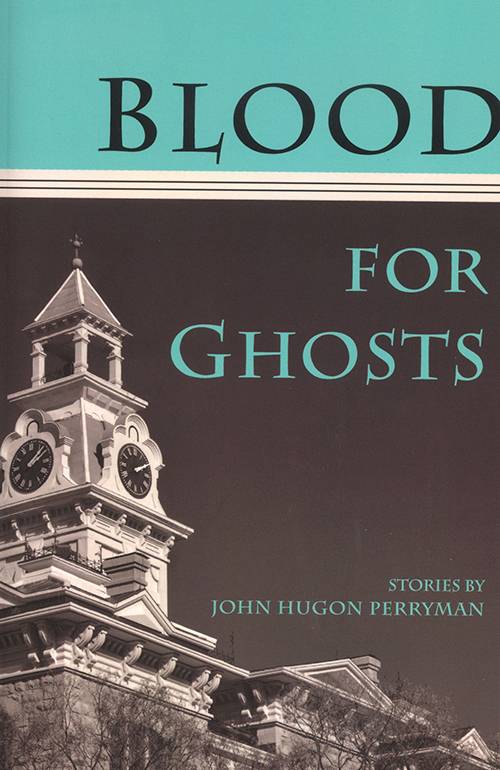
Blood for Ghosts: Stories
by John Hugon Perryman
Nacogdoches: Stephen F. Austin State University Press, 2016.
202 pp. $16.00 paper.
Reviewed by
Cedric Synnestvedt
“Mavens of Texas literature will find some familiar themes herein—regeneration through violence, the destruction of history and identity, the dead—but they will also be pleasantly surprised by some genre and convention bucking. Women and minorities feature prominently. Many of them are ghosts.”
Blood for Ghosts, the debut story collection by (fourth generation Texan) John Perryman, contains many voices. Mavens of Texas literature will find some familiar themes herein—regeneration through violence, the destruction of history and identity, the dead—but they will also be pleasantly surprised by some genre and convention bucking. Women and minorities feature prominently. Many of them are ghosts. This is not to say that the collection feels disconnected by Perryman’s acrobatic switching of character and genre. On the contrary, all of the stories in this collection share similar concerns. Characters hunger for identity and truth. They struggle to preserve the past from those who would bury it. They run from themselves. They make terrible mistakes. They are us. And the stories, while grounded in their own authentic worlds, do not live in a literary vacuum. There are notes of Hawthorne, Poe, and others, especially in the chilling and mythic “Holy Ghost Man” and in the hilarious and unexpectedly sad “Wives of the Dead.”
The collection opens with “Necropolis,” a tale about ghosts haunting the newly expanded Central Expressway in Dallas, after digging machines disinterred their bodies from what was a mass grave for African slaves. Watching their march from the 32nd floor of an office building is Remedios, a cleaning woman, whose point of view bookends the story and establishes one of Perryman’s central themes—the often unseen influence of women on culture and history, and also the treatment and burial of the dead.
Maybe the most conventional story in the collection, “Five Mississippi,” is about a small town high school football coach, whose longing for a son is temporarily assuaged by his bond with his star quarterback, Ray. As the title suggests, the story is a meditation on our sense of time and our desire to be remembered as having accomplished something of value. While “Five Mississippi” might feel like a departure early on from the supernatural, the political, and the tall tale, its last scene, a lovingly choreographed final play of a high stakes game, is, in its precision of detail and rhythm, moving and literary, but its inconclusive outcome—all of life is contained in the arc of a football thrown into the end zone—also echoes the problem of permanence and mortality.
The book ends with “Degüello,” the story of a single mother, Cassie, who is pitted against the complacent town of Stockbridge, thought to be the site of the final Comanche raid in Texas. To commemorate the event, a bugler would play “Reveille” every Monday morning for the past 120 years, but the current bugler has threatened to quit. As in other stories, tradition is being threatened by progress, and the town risks losing not just its past, but also its present identity. Here Perryman exhibits all of his skills, ranging from the humorous, to the violent and bloody, and to the Faulknerian.
The story opens with an unforgettable scene in which Cassie is castrating cattle, and she is disappointed by their apparent calm and acceptance toward the matter. Perryman writes:
She went so far as to imagine that one particular calf was taunting her, resisted screaming so as to hoard knowledge of an event so terrible that it defied expression in sound: an experience Cassie could never know and yet one of which she’d become suddenly, and strangely, envious.
The story ends with Cassie, having just poorly played “Reveille” to wake the town at an ungodly hour, on the roof of the church, poised above the trap door, bugle held ready to strike the first townsman coming for her.
If the collection has its weakness, it could be in an exuberance of interiority and backstory that occasionally steps into the overly explanatory. “Never No Inkling Or, The Ever-Present Danger of Praying a Lie,” an otherwise touching study in character and the search for meaning in the supernatural, reads at times like the narrator (one of the most authentic in the whole collection) explains her reasoning so much that it becomes redundant. And there are occasionally long backstories that sometimes slow the drama. The masterful final football scene in “Five Mississippi,” for instance, is a long time in getting there, as the reader has to work through pages of coaches discussing strategy, which seem to do little for the drama or the characters.
By the end of the eight stories, though, the above grievances may only amount to minor offenses. Conceptually, Perryman has put together a collection that has an earnestness to it that undermines current trends of glibness and cynicism. Here characters desire a spiritual space greater than the dimensions of their own limited selves. These stories make us look at ourselves and ask how do we want to be remembered. Did we fight the good fight? Did we take risks when it mattered? Did we love hard enough? Were we open enough? Do we listen enough to those voices whom political greed and history’s writers have for so long sought to silence, but whose blood we can never forget?
Cedric Synnestvedt earned his MFA in fiction from Texas State University in 2013. There, he teaches writing while he is not working on his own. His stories can be read in [PANK] Magazine and The Sonora Review.
